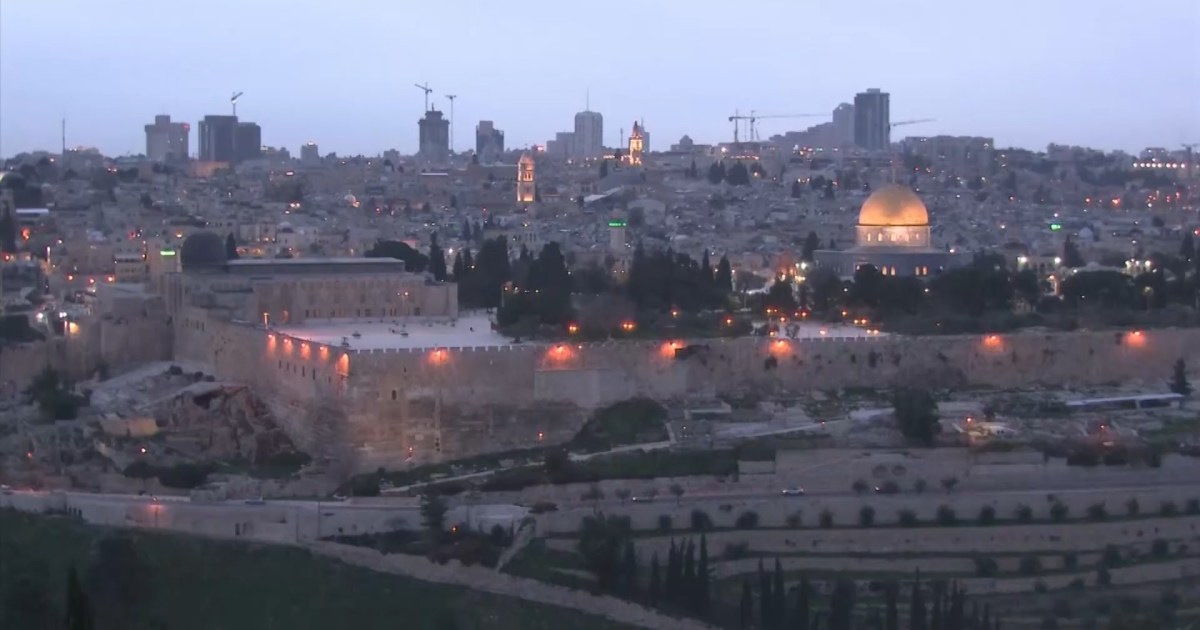Israeli media reported that the Israeli political and security leadership decided to close Al-Aqsa Mosque to Jews entering from next Friday, until the end of Ramadan.
And the Israeli media reported that the decision came after consultations held by Prime Minister Naftali Bennett, against the backdrop of heightened tension, and in an attempt to defuse the explosion.
According to the decision, Jews will not be allowed to enter during the time periods allotted to them by the Israeli authorities throughout the week, from Sunday to Thursday, knowing that they are religiously prohibited from entering on Friday and Saturday.
On the other hand, Yedioth Ahronoth newspaper said that the Israeli police summoned the officials of the flag march and informed them of its refusal to secure the march after the threat of Hamas.
The occupation forces withdrew from Al-Aqsa Mosque after a number of extremists stormed the mosque’s courtyards on the Jewish Passover holiday, for the third time in 3 days.
In the West Bank, more than 90 Palestinians were injured in clashes between the Israeli occupation forces and Palestinians at the entrance to the village of Burqa, north of Nablus, who were protesting against the occupation army’s security of the settlers’ buses arriving at the ruins of the Homesh settlement outpost that the Israeli government vacated in 2005.
max division
In the city of Hebron, the Israeli occupation authorities continue to close the Ibrahimi Mosque to Palestinians for the second day in a row and allow dozens of Jews to perform their religious rituals in its squares under the pretext of Jewish holidays.
The occupation also tightened its military measures inside the Old City of Hebron and closed a number of streets leading to the Ibrahimi Mosque.
For its part, the Palestinian Authority accused Israel of seeking to divide the space and time of Al-Aqsa.
Hamas also called on the Palestinian people in the West Bank to mobilize and mobilize to stop the violations of the occupation in the Ibrahimi Mosque in Hebron.
The movement considered the occupation authorities' closure of the mosque in front of worshipers to hold a concert as a serious violation of Islamic sanctities and a provocation to the feelings of Muslims.
Sheikh Raed Salah, head of the Islamic movement inside the Palestinian territories, also called on the United List, which is the political arm of the southern Islamic movement, for the immediate withdrawal from the Israeli government.
Sheikh Raed Salah had arrived at Al-Aqsa Mosque after incursions carried out by settlers yesterday morning, under the intense protection of the occupation police.
Al-Jazeera correspondent said that the Islamic Endowments Council met with a delegation from the Palestinian interior, in the presence of Sheikh Raed Salah and Muhammad Baraka, head of the Follow-up Committee and Representative Osama Al-Saadi for the Joint Arab List.
And Israeli Defense Minister Benny Gantz threatened to strike hard at what he described as terrorist organizations in Gaza if the shooting and incitement continued, as he put it.
Gantz said that the Israeli army and security services are ready to deal with every emergency and every scenario, and to preserve freedom of worship in Jerusalem, as he put it.
The permanent representative of Palestine to the United Nations, Riyad Mansour, called on the UN Security Council to act to stop the aggression against the Palestinians in Al-Aqsa Mosque and the Al-Haram Al-Sharif immediately.
It also called on the Security Council to provide international protection for the civilian population under occupation.
An American commitment to Israel's security
In a parallel context, Israeli Foreign Minister Yair Lapid informed US Secretary of State Anthony Blinken about the reasonable and responsible efforts - as he put it - that Israel is making to preserve freedom of worship for all religions in Jerusalem.
A statement issued by the Israeli Foreign Minister's office added that Minister Blinken called Minister Lapid, and that the latter emphasized the importance of the Jewish holidays, the Christian Passover, and the month of Ramadan.
Lapid told Minister Blinken that Israel would not be willing to accept calls for violence, and stressed the need for international support to restore calm to Jerusalem.
In international reactions, the US State Department reported that Blinken spoke with his Israeli counterpart, Yair Lapid, about the importance of Israelis and Palestinians working to end the cycle of violence by exercising restraint and refraining from actions that stoke tension.
The two ministers also discussed joint efforts to confront global challenges such as Iran and its proxies, according to the statement's description.
The US Secretary of State reiterated the US administration's firm commitment to Israel's security, and condemned the recent rocket attacks from Gaza.
Blinken stressed his country's support for the negotiated two-state solution and the desire to expand and deepen Israeli relations in the region after the Negev summit.
The US State Department also said that Blinken discussed with Palestinian President Mahmoud Abbas the increasing tension and violence in Israel, the West Bank and Gaza.
He stressed the importance of Palestinians and Israelis working to end the cycle of violence by refraining from actions and rhetoric that would escalate tension.
Blinken affirmed the United States' commitment to improving the lives of Palestinians in tangible ways and America's support for a negotiated two-state solution.

